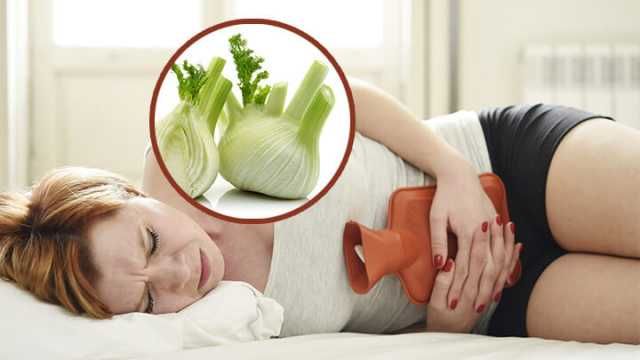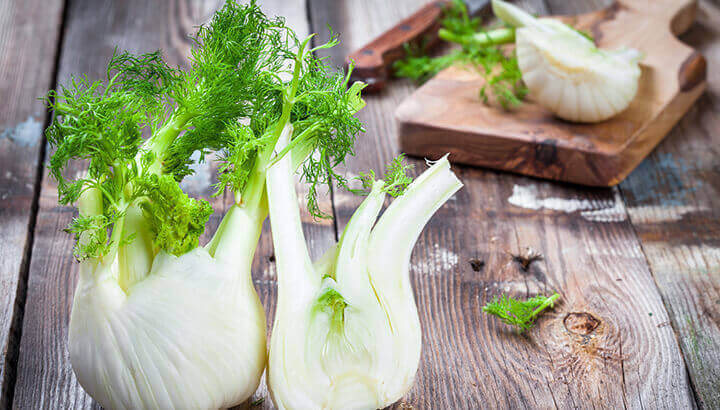
Are you tired of lettuce, tomatoes, carrots and celery? Do all the “normal” vegetables in your fridge and cupboards fail to excite you these days? If you’re looking for a healthy, lesser-known veggie to star in your roasts, salads, sides and grilled dishes this summer, you should seriously consider trying fennel.
Fennel is a relative of carrots, parsley and coriander, though it has a taste that is uniquely its own. Fennel bulbs have the texture of celery, with a mildly sweet, refreshing, delicious flavor. The leaves make a great garnish for salads, soups and more. While this vegetable isn’t hard to find in most grocery stores, many people still have not made it a regular part of their menus.
This is somewhat of a shame, as fennel is a great source of amazing flavors and significant health benefits. The following are six reasons to put fennel on your grocery list ASAP.
Enjoy a rich nutritional profile
Fennel is a good source of a number of B-vitamins, and it contains an ample amount of vitamin C. On top of that, fennel contains fiber, calcium, copper, iron, magnesium, manganese, molybdenum, potassium and phosphorus. As you can see, adding this nutritionally rich veggie to your meals is a great way to get many of your daily vitamins and minerals.
Protect your heart

On top of a wealth of nutrients, fennel also contains some potent antioxidant compounds. These include quercetin and rutin, which helps to combat chronic inflammation. This is a key benefit, as uncontrolled inflammation can pave the way for many illnesses, including heart disease.
Fennel also contains a good amount of fiber, which is crucial to the health of your cardiovascular system. Among many other benefits, getting enough fiber in your diet may help to lower your risk of a heart attack. Fiber may also help to lower LDL (“bad”) cholesterol, which is yet another perk for your ticker.
If that wasn’t enough, fennel is a good source of potassium, a mineral known for helping to stabilize blood pressure level and regulating heartbeat. A diet rich in potassium may help to prevent both strokes and heart attacks, so fennel is a great candidate for your next dinner menu.
Help prevent cancer and chronic disease
Along with its many other nutritional and antioxidant benefits, fennel contains a phytonutrient known as anethole. Some research has found that anethole may help to lower inflammation and prevent the development of cancer. It is thought to do so by shutting down TNF (tumor necrosis factor). While more research needs to be done, the studies that have been done are promising news for prevention.
Support your immune system
Because fennel contains vitamin C, it is a great veggie to eat on a regular basis to support the optimal functioning of your immune system. Vitamin C is essential during cold and flu season, as it may help your body to more effectively fight off those nasty bugs. It may also help you to recover more quickly should you fall ill.
On top of boosting immunity, vitamin C is also important to skin and hair health, and for the control of free radical damage throughout the body.
Soothe menstrual pain
Many women experience abdominal cramps during their time of the month. For some women, the cramps are mild, for others, they’re excruciating. Instead of reaching directly for the painkillers when you feel those cramps coming on, give fennel a try. There is some evidence that extract of fennel may help to significantly reduce cramping in a much more safe and natural way than NSAIDs.
Relief from menopause symptoms
Not only can fennel help during menstruation, it may be able to help with the uncomfortable symptoms of menopause, as well. For a recent study published in the journal Menopause, researchers studied the effects of fennel capsules on a small group of 79 women between the ages of 45 and 60. Results showed that fennel was significantly effective in reducing menopause symptoms.
On these results, Dr. JoAnn Pinkerton of the North American Menopause Society stated:
“This small pilot study found that, on the basis of a menopause-rating scale, twice-daily consumption of fennel as a phytoestrogen improved menopause symptoms compared with an unusual minimal effect of placebo. A larger, longer, randomized study is still needed to help determine its long-term benefits and side effect profile.”
Furthermore, the study authors added that “fennel is an effective and safe treatment to reduce menopausal symptoms in postmenopausal women without serious side effects.”
A few fun fennel ideas

Here’s how to incorporate fennel into more of your meals:
- Make a fennel salad by chopping fennel bulbs, adding some golden raisins and red onions, and drizzling with fresh orange juice and olive oil. Garnish with fennel leaves.
- Add thinly sliced fennel to your sandwiches.
- Roast some fennel in olive oil and top with Himalayan salt and some black pepper — a great alternative to potatoes!
- Serve a side of fresh fennel with your favorite vinaigrette for fish dishes.
- Toss some chopped fennel in olive oil and throw it on the grill.
What is your favorite way to enjoy fennel?
— Tanya Mead

